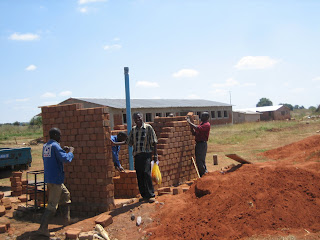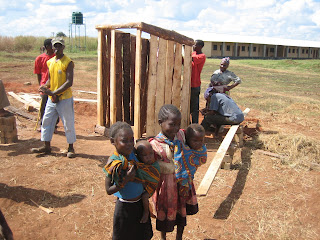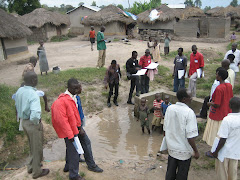 The first week we taught sanitation promotion to 10 school directors (principals) of basic schools that ranged from 1000 to 1500 children and 10 sanitation promoters hired by the Ethiopian Evangelical Church Mekane Yesus (EECMY). They each represented communities of 500 to 800 people. Sanitation promotion may not sound important, but it was the most critical training since many people have never even seen or used a latrine. One rainy day, we traveled 2 hours to one of the schools to practice sanitation promotion with a target group of fathers. It is hard to convince people that their health depends on good sanitation. The fact that improved health will cost them less money and allow them to produce more income is a more convincing reason to them to practice sanitation. We learned that the project was a partnership between EECMY, Lifewater International, and USAID. The goal is for EEMCY to assure that 10 latrines are constructed in each school and one in each of 10 communities. If you do the math, the project should directly improve the lives of something on the order of 19,000 people.
The first week we taught sanitation promotion to 10 school directors (principals) of basic schools that ranged from 1000 to 1500 children and 10 sanitation promoters hired by the Ethiopian Evangelical Church Mekane Yesus (EECMY). They each represented communities of 500 to 800 people. Sanitation promotion may not sound important, but it was the most critical training since many people have never even seen or used a latrine. One rainy day, we traveled 2 hours to one of the schools to practice sanitation promotion with a target group of fathers. It is hard to convince people that their health depends on good sanitation. The fact that improved health will cost them less money and allow them to produce more income is a more convincing reason to them to practice sanitation. We learned that the project was a partnership between EECMY, Lifewater International, and USAID. The goal is for EEMCY to assure that 10 latrines are constructed in each school and one in each of 10 communities. If you do the math, the project should directly improve the lives of something on the order of 19,000 people.The second week, we taught actual latrine construction to the 10 promoters and 10 community leaders. We discovered that they didn’t realize that maggots weren’t innocent white worms when we discussed how a latrine could control flies and odors. We constructed a VIP (Ventilated Improved Pit) latrine structure from locally available materials (structure from Eucalyptus & mud) and had them participate in construction of a portable, cement slab.
The students seemed to grasp the statement that I had heard: safe WAter reduces mortality rates by about 17%, Sanitation reduces it by about 35%, and Hygiene reduces it by something like 25% but the combination of the three (WASH) reduces mortality by about 65%. EECMY repeatedly points to its holistic ministry (promoting good health along with evangelizing), so they were quick to embrace the need for WASH instead of just safe drinking WAter.
Ethiopia may sound like a hopeless place with its over-population, famine, and poverty problems, but actually we were very surprised to see very positive signs of development since I was there 2 years ago (new roads, new buildings, and improved infrastructure). We were asked by the urban planning commission of “Hosanna town” to discuss sanitation with them. They mentioned a high death rate among children and the problems you would expect for a town of 77,000 people with no public latrines. We made some recommendations that included a promotion campaign followed by constructing public demonstration latrines in high traffic places like the bus station. They should require what amounts to 1 cent to use them, so someone could be paid to keep them clean. This is a picture in the heart of town.
One weekend we visited the Ajora falls which according to their register hadn't been visited for a month -- Ethiopia has great tourist potential. Two rivers come together here and fall over 900 feet.









